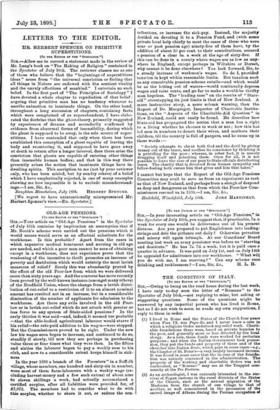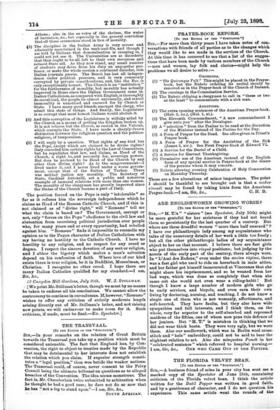THE CONDITION OF ITALY. [To THE EDITOR OF THE "SPECTATOR."]
Sin,-0 wing to being on the road home during the last week, I have only to-day seen the letter of "Romano" to the Spectator of July 16th,—not replying to mine, but asking or suggesting questions. Some of the questions might be answered by any impartial person who has lived in Rome, but as I do not wish to seem to evade my own suggestions, I
reply to them in order.
(1) I lived in Rome and the States of the Church four years when Pius IX. was Papa-Re, and I never knew a case in which a religious Order undertook any relief work. Charit- able foundations there were, based on private legacies to the poor, and generally more or less directed by the local clergy. As a rule, these funds were worked for sectarian purposes ; and when the Italian Government took posses- sion, they put the funds and property of these and of the churches into Italian Rents, which pays in some cases—e.g., the Chapter of St. Peter's—a very largely increased income. It was found in some cases that the income of the founda- tion was entirely consumed in the administration. The property of the working and charitable Orders was not confiscated, as " Romano " may see at the Trappist com- munity at the Tre Fontane.
(2) As an archmologist, I was curiously interested in the sur- vival of Pagan customs in the rural districts of the States of the Church, such as the annual migration of the Madonna from the church of one village to that of another, so well remembered in the procession of the sacred image of Athena during the Persian occupation of
Athens ; also in the ex-votos of the shrines, the water of lustration, &c., but especially in the general conviction that all these ceremonies stood in lieu of morality.
(3) The discipline in the Italian Army is very severe and admirably maintained in the rank-and-file, and though I am told by Italians that demoralisation is creeping in, I could not yet see it. The Universities are so disorderly that they ought to be all left to their own resources and refused State aid. As they now stand, any small number of students may drive from his duty an unpopular pro- fessor, or make the whole session a continued disorder, vide Italian journals passim. The Bench has lost all indepen- dence under political pressure, and is very commonly corrupted by private considerations, and, like the Bar, is only exceptionally honest. The Church is an "institution" for the furtherance of morality, but morality has actually improved in Rome since the Italian Government came in. Italian Catholicism, as compared with English,is thoroughly de-moral-ised, the people lie almost universally, and sexual immorality is unnoticed and uncared for by Church or State. I have many good friends amongst the clergy, who admit this state of things. And finally, the Legislature is so corrupt that most honest Italians would abolish it.
And this corruption of the Legislature is wilfully aided by the Church as a means of getting the Kingdom broken up. It is not religion but the Church, as seated in the Vatican, which corrupts the State. I have made a sharply-drawn distinction between the religious question and the politico- religious, of temporalism.
(5) I will reply by a question. What rights of any kind has the Pope, except which are claimed to be divine rights ? Italy conceded him certain rights by the Law of Guarantees, but he repudiates that law, and claims, as Head of the Church, a right to, and necessity for, sovereign powers. But does he pretend to be Head of the Church by any other than divine right ? As to the misgovernment—I lived under it, and I never lived under a worse govern- ment, except that of the Sultan of Turkey. There was neither justice nor morality. The Secretary of State, Cardinal Antonelli, set a public and notorious example of immoral relations with more than one woman. The morality of the clergymen has greatly improved since the States of the Church became a part of Italy.
The position forced on the Pope is only "intolerable" so far as it refuses him the sovereign independence which he claims as Head of the Roman Catholic Church, and if this is not claimed as of "divine right," will "Romano" tell me what the claim is based on ? The Government, corrupt or not, only "forces on the Pope " obedience to the civil law and abstention from exercising political jurisdiction over people who, for many years and at every opportunity, had rebelled against him. "Romano" finds it impossible to reconcile my opinion as to the Pagan character of Italian Catholicism with my having no hostility to the Catholic Church. I have no hostility to any religion, and no respect for any creed or dogma. I respect the sincere devotion of any sect or religion, and I abhor the bigotry which makes a man's salvation depend on his confession of faith. Where love of our kind exists there is true religion, be it in Buddhist, Mussulman, or Christian. I recognise no other creed. I hope there are many Italian Catholics qualified for my standard.—I am, Sir, &c.,
(4)
12 Campden Hill Gardens, July 20th. W. J. STILLMAN.
[We print Mr. Stillman's letter, though we most by no means be taken to endorse all his conclusions. We cannot allow the controversy to continue in our columns. If, however, "Romano' wishes to offer any criticism of strictly moderate length arising directly out of Mr. Stillman's letter, and not raising new points, we will endeavour to make room for it. Such criticism, if made, must be final.—En. Spectator.]



































 Previous page
Previous page